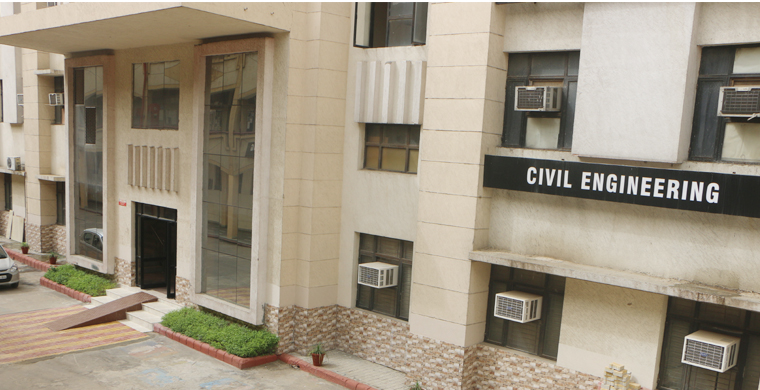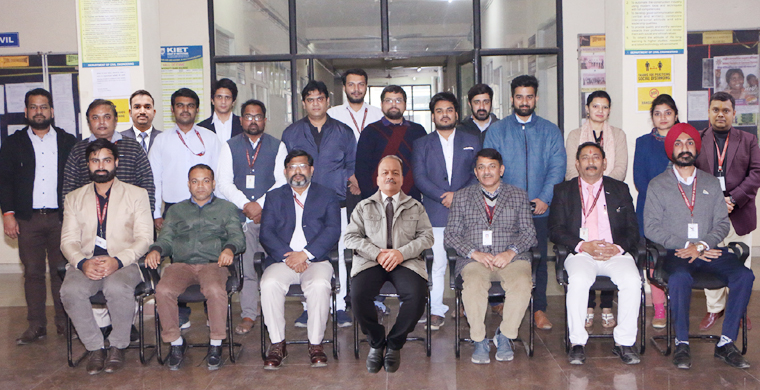Civil Engineering
About
Vision
To emerge as a preferred destination for Civil Engineering education and produce competent professionals and future leaders to serve people of the world.
Mission
- To strengthen and practice the learner-centered framework of teaching-learning for imparting quality technical education in the field of Civil Engineering.
- To promote research, development and consultancy work by frequent interaction with industry and research organizations.
- To facilitate students for imbibing wide range of required skills to become successful professionals and business leaders.
- To inculcate a life-long learning attitude and instill values, morality and professional ethics to serve society.


Program Educational Objectives (PEOs) of B. Tech. Civil Engineering
After few years of graduation, the graduate will be able to- PEO 1: Exhibit the technical and professional attributes for the application and contribution in different areas of Civil Engineering.
- PEO 2: Deliver the sustainable and innovative solutions to the real-life problems in a specialized domain of Civil Engineering.
- PEO 3: Communicate effectively, manage and utilize resources efficiently for timely accomplishment of the targeted tasks.
- PEO 4: Apply state-of-art technology to render quality, worthy and ethical services to society.
Program Specific Outcomes (PSOs) of B. Tech. Civil Engineering
Civil Engineering graduates will be able to
- Apply the knowledge of analysis and design of structural system to cater the infrastructural need of the society.
- Execute quality construction work within the stipulated period of time and resources.
Program Outcomes (POs) of B. Tech. Civil Engineering
Engineering Graduates will be able to:- Engineering Knowledge: Apply the knowledge of mathematics, science, engineering fundamentals, and an engineering specialization to the solution of complex engineering problems.
- Problem Analysis: Identify, formulate, review research literature, and analyze complex engineering problems reaching substantiated conclusions using first principles of mathematics, natural sciences, and engineering sciences.
- Design/development of solutions: Design solutions for complex engineering problems and design system components or processes that meet the specified needs with appropriate consideration for the public health and safety, and the cultural, societal, and environmental considerations.
- Conduct investigations of complex problems: Use research-based knowledge and research methods including design of experiments, analysis and interpretation of data, and synthesis of the information to provide valid conclusions.
- Modern tool usage: Create, select, and apply appropriate techniques, resources, and modern engineering and IT tools including prediction and modeling to complex engineering activities with an understanding of the limitations.
- The engineer and society: Apply reasoning informed by the contextual knowledge to assess societal, health, safety, legal and cultural issues and the consequent responsibilities relevant to the professional engineering practice.
- Environment and sustainability: Understand the impact of the professional engineering solutions in societal and environmental contexts, and demonstrate the knowledge of, and need for sustainable development.
- Ethics: Apply ethical principles and commit to professional ethics and responsibilities and norms of the engineering practice.
- Individual and team work: Function effectively as an individual, and as a member or leader in diverse teams, and in multidisciplinary settings.
- Communication: Communicate effectively on complex engineering activities with the engineering community and with society at large, such as, being able to comprehend and write effective reports and design documentation, make effective presentations, and give and receive clear instructions.
- Project management and finance: Demonstrate knowledge and understanding of the engineering and management principles and apply these to one’s own work, as a member and leader in a team, to manage projects and in multidisciplinary environments.
- Life-long learning: Recognize the need for, and have the preparation and ability to engage in independent and life-long learning in the broadest context of technological change.
